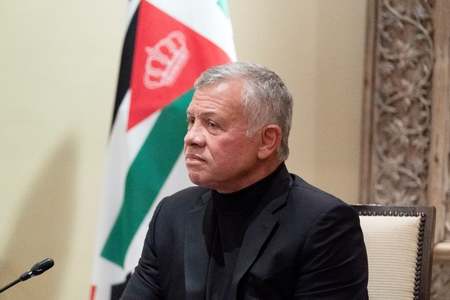JERUSALEM: Israel formally agreed on Tuesday to double the amount of fresh water it provides to neighbouring Jordan, one of the world’s most water-deficient nations.
The two countries announced in July that Israel would sell 50 million cubic metres of water a year to Jordan, doubling what it already supplies, according to the terms of a peace deal from the 1990s.
The new agreement is proof that “we want good neighbourly relations,” Karine Elharrar, Israel’s minister of infrastructure, energy and water resources, said in a statement.
Elharrar travelled to Jordan for a signing ceremony between representatives of the Joint Water Committee that manages bilateral relations in the sector.
A source from Jordan’s water and irrigation ministry confirmed that the two sides inked the agreement for Jordan to “purchase additional quantities of water... outside the framework of the peace agreement”.
Gidon Bromberg, Israel director of the regional environmental group EcoPeace Middle East, said the deal “represents the largest water sale in the history of the two countries”.
It “reflects the growing understanding that the climate crisis already heavily impacting the region must lead to increased cooperation”, he said.
In the West Bank, Israel controls underground water and distributes it unfairly, according to Human Rights Watch. “Israel’s discriminatory water policies in the West Bank enable settlers to enjoy bountiful water, while some Palestinian communities lack sufficient water to provide for their basic needs,” the group wrote in an April report accusing Israel of crimes of “apartheid”.
Israel says it is abiding by the terms of the Oslo Accords and accuses HRW of an “anti-Israeli agenda”.
Jordanian-Israeli cooperation on water goes back a hundred years.
In 1921, a Russian-Jewish engineer convinced British and Hashemite authorities to approve a hydropower station where the Yarmuk tributary meets the Jordan River.
Even when the two nations were enemies following the 1948 war that led to Israel’s creation, Jordan and Israel held water cooperation meetings that helped shape their 1994 peace deal.
Under that accord, Israel agreed to sell Jordan 45m cubic metres of water a year for a reduced price, with an option to buy more water depending on the status of the Yarmuk, said Itai Dodi, spokesman for Israel’s Water and Sewage Authority.
The deal signed on Tuesday allows Jordan to buy additional water at 65 cents per cubic metre for one year, with an option to buy the same amount for a further two years but at a slightly higher price.
“It’s the realistic price, this is the cost of the water,” Dodi said, adding that it would come from the Sea of Galilee.
Jordan, nearly landlocked, faces dire water prospects as its population expands and temperatures rise.
“Jordan... is now the second-most water insecure country in the world, by some measures,” the Century Foundation, a US think tank, wrote in a December report.
“Water needs are expected to exceed resources by more than 26 per cent by 2025.”
Israel is also a hot, dry country, but desalination technology has opened opportunities for selling fresh water.
The deal comes after bilateral relations had cooled under Israel’s former prime minister Benjamin Netanyahu.
Naftali Bennett, who took over in June, has made strengthening ties with Amman a priority.
Israel normalised ties with four other Arab nations as part of the so-called Abraham Accords brokered by the administration of former US president Donald Trump.
Negotiations with Palestinians in the occupied West Bank and the Gaza Strip remain largely frozen.
Bennett, a former settler leader, does not support the creation of a Palestinian state.
The agreement with Jordan will not address Palestinian access to water, Dodi said.
In Gaza, over-pumping and pollution have rendered an underground aquifer nearly unusable.
Published in Dawn, October 13th, 2021













































